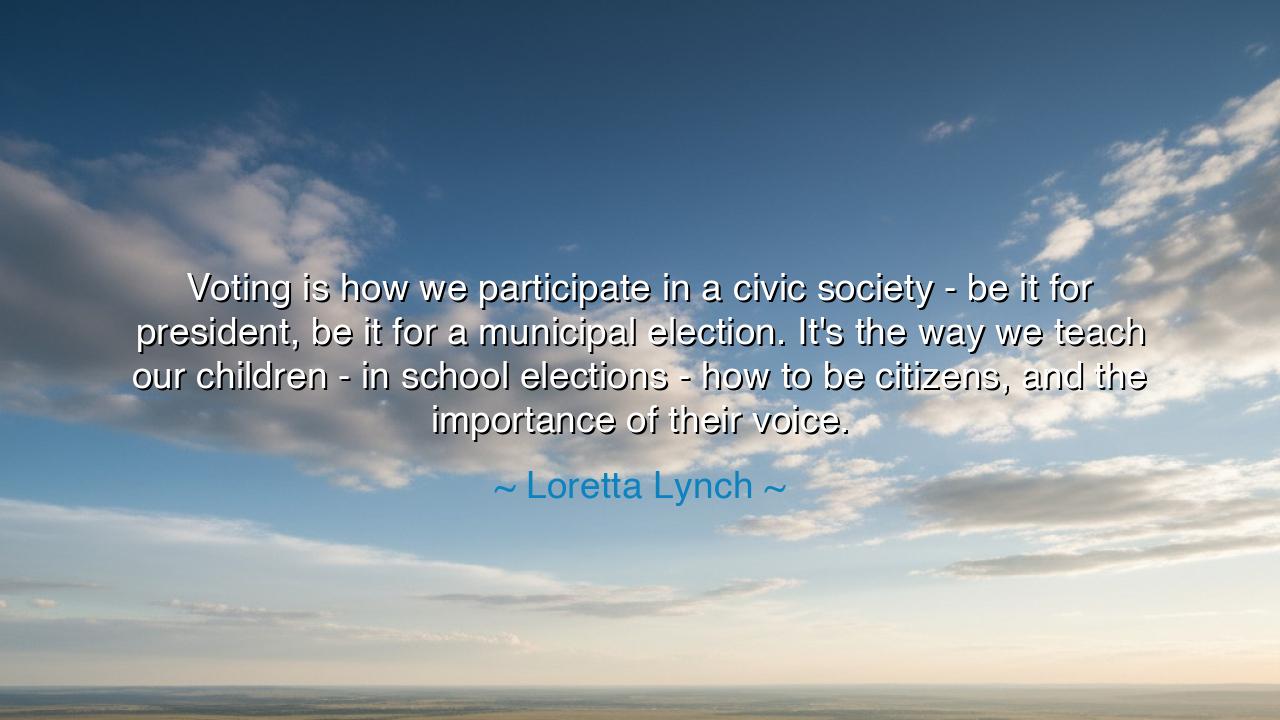
Voting is how we participate in a civic society - be it for
Voting is how we participate in a civic society - be it for president, be it for a municipal election. It's the way we teach our children - in school elections - how to be citizens, and the importance of their voice.






The words of Loretta Lynch, “Voting is how we participate in a civic society – be it for president, be it for a municipal election. It's the way we teach our children – in school elections – how to be citizens, and the importance of their voice,” are not mere instruction but a sacred reminder. She names voting not as a mechanical act, but as the lifeblood of a free people, the ritual by which a community breathes together, and the song by which each individual joins in the chorus of citizenship. For in every ballot cast, there is more than choice—there is the affirmation that one’s voice matters, and that the destiny of the community belongs to all, not to the few.
The origin of this truth is ancient. From the Athenian agora where free citizens lifted their hands to shape the fate of the polis, to the Roman assemblies where votes determined laws and leaders, the act of participation has always been the foundation of liberty. Lynch, as the first African-American woman to serve as U.S. Attorney General, spoke with the weight of history behind her—a history where the right to vote was long denied to women, to the poor, to Black Americans, to the marginalized. Her words remind us that civic society is not born fully formed; it is built, protected, and renewed by the simple but profound act of casting a vote.
History bears witness to the power of this act. In the United States, the struggle for voting rights during the Civil Rights Movement revealed the stakes of democracy. Brave men and women marched in Selma, faced clubs and fire hoses, and bled on the Edmund Pettus Bridge so that their voices might finally be heard at the ballot box. Their sacrifice carved into law the Voting Rights Act of 1965. This story illustrates Lynch’s teaching: voting is the way we teach our children the sacredness of their voice—not by words alone, but by example, often by blood.
The meaning of her words extends beyond national elections. She reminds us that democracy lives not only in the grand stage of presidential contests but also in the humble corners of municipal elections, in school boards, in local councils, in the quiet decisions that shape daily life. To neglect these is to forget that power flows in rivers, not only in oceans. By teaching children to vote in school elections, we prepare them not only for ballots but for life, showing them that their voice, however small, is the seed of change.
Her wisdom is also a call to humility. For the power of civic society does not rest in the hands of rulers alone, but in the habits of the people. If the people fall silent, the society decays; if the people speak through their votes, the society renews itself. The ballot is the shield against tyranny and the torch that lights the way for generations. When Lynch speaks of teaching children, she speaks of continuity: each generation must learn anew that freedom survives only when it is exercised.
The lesson for us is clear: do not neglect the act of voting. It may seem small, even insignificant, but it is the thread from which the garment of democracy is woven. Every missed election is a fraying of that garment, every ballot cast is its mending. To abstain is to surrender your place in the community’s destiny; to vote is to affirm that you belong, that you care, that you will be counted among those who shape the future.
Practical actions are within reach of all. Register yourself, and help others register. Teach children not only the mechanics of elections, but the meaning: that to vote is to honor those who fought for the right, and to protect those who will inherit the world after us. Participate not only in national contests but in local ones, for they shape the schools, the roads, the waters, and the laws you live under daily. And above all, cherish the voice you hold, for it is both a privilege and a duty.
Thus let Loretta Lynch’s words endure: voting is how we participate, how we teach, how we affirm the power of our voices. It is the covenant between generations, the shield of the weak, and the instrument of the strong. Let no one despise it as small, for within it lies the destiny of nations. Teach it to your children, honor it in your own life, and guard it as one of the holiest treasures of a free society.






AAdministratorAdministrator
Welcome, honored guests. Please leave a comment, we will respond soon